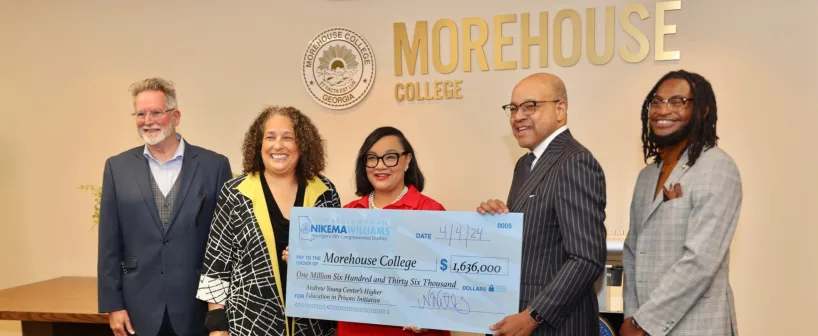By Evan Castillo
The federal government is helping Morehouse College expand and strengthen its prison education program.
Congresswoman Nikema Williams presented the Atlanta historically Black men’s college with $1.6 million from federal Community Project Funds on April 4 to fund more classes for incarcerated students.
The funding will also support Morehouse faculty, program participants, and student ambassadors who help teach humanities courses and college-prep seminars to incarcerated students.
Morehouse opened its Andrew Young Center for Global Leadership’s (AYCGL) Higher Education in Prisons Program in 2020 and has taught over 180 students in DeKalb, Forsyth, and Fulton counties.
“My focus in Congress is uplifting marginalized communities, and few communities need this support more than incarcerated and formerly incarcerated individuals,” Williams said in a press release.
“Historically, we haven’t invested in the futures of incarcerated individuals, and this helps no one. Our prison population — overwhelmingly and disproportionately — is comprised of Black men. It continues to grow, and the recidivism rates are sky high.”
Morehouse will use the investment to grow the program to serve roughly 200 students a year, increase the class offerings from two to eight, and strengthen the Prison Education Ambassadors Program.
The student ambassadors help teach in prisons and jails and raise their fellow students’ awareness of criminal justice issues, prison education value, and mass incarceration’s impact on the community.
“Morehouse has more moral authority to speak to the issues affecting Black men than any other place on the planet,” Morehouse President David A. Thomas said in a press release.
“Our hope with the work that we are doing is that in some way those men getting exposure to the educational resources, pedagogy, and experiences that we know how to provide will increase their human capital.”
According to the Prison Policy Initiative, Georgia has one of the highest incarceration rates in the world — with 968 per 100,000 residents incarcerated. This includes prisons, jails, immigration detention centers, and juvenile justice facilities.
It found Black state residents are more than twice as likely — and Latino/a residents are three times as likely — as white residents to be incarcerated in Georgia.
“The link between education and recidivism is clear: the higher the education, the less likely the chance of recidivism,” Charles Adams, Bowie State University’s criminal justice department chair and co-director of its prison education program, previously told BestColleges.
“By giving these men a chance at higher education, we can potentially keep them out of prison, thereby improving their lives, the lives of their families, and benefiting society as a whole.”
In July 2023, the U.S. Department of Education granted incarcerated students access to the Pell Grant for the first time since 1994.
Four months later, in November, Northwestern University graduated its first cohort of 16 incarcerated students. California State University, Dominguez Hills offers two-year master’s degree programs for incarcerated students, and Miami Dade College has served over 900 incarcerated students since it began in 2013.
However, as Morehouse seeks to expand its prison education program, a neighboring Atlanta college, Georgia State University (GSU), recently ended its prison education project due to budget cuts. The university had to reduce its budget by $24 million in fiscal year 2024, according to FOX 5.
It also cited “complex accreditation requirements” as a reason for ending its program.
“GSU would have to navigate a multifaceted process over two years,” GSU told FOX 5. “This process involves submitting substantive changes for additional locations, undergoing evaluations by accrediting bodies, and adhering to various stringent standards.”

